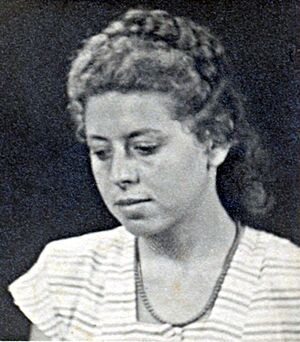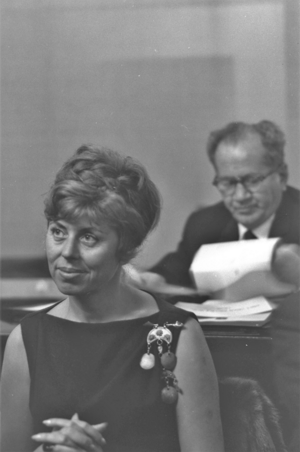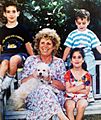Shulamit Aloni facts for kids
Quick facts for kids
Shulamit Aloni
|
|
|---|---|
| שולמית אלוני | |

Shulamit Aloni as a young girl
|
|
| Ministerial roles | |
| 1974 | Minister without Portfolio |
| 1992–1993 | Minister of Education and Culture |
| 1993 | Minister without Portfolio |
| 1993–1996 | Minister of Communications |
| 1993–1996 | Minister of Science and the Arts |
| Faction represented in the Knesset | |
| 1965–1967 | Labor Alignment |
| 1967–1968 | Labor Party |
| 1968–1969 | Alignment |
| 1974–1975 | Ratz |
| 1975–1976 | Ya'ad – Civil Rights Movement |
| 1976–1981 | Ratz |
| 1981–1984 | Alignment |
| 1984–1992 | Ratz |
| 1992–1996 | Meretz |
| Personal details | |
| Born |
Shulamit Adler
27 December 1927 Włocławek, Poland |
| Died | 24 January 2014 (aged 86) Kfar Shmaryahu, Israel |
| Spouse | Reuven Aloni |
| Children | 3 |
| Alma mater | Hebrew University, L.L.B | David Yellin College of Education, BA |
Shulamit Aloni (Hebrew: שולמית אלוני; born December 27, 1927 – died January 24, 2014) was an important Israeli politician. She was known for starting the Ratz party. She also led the Meretz party and was the Leader of the Opposition from 1988 to 1990. From 1992 to 1993, she served as the Minister of Education. In 2000, she received the prestigious Israel Prize for her lifetime achievements.
Contents
Who Was Shulamit Aloni?
Her Early Life and Education
Shulamit Adler was born in Włocławek, Poland. Her mother was a seamstress, and her father was a carpenter. Both came from families of Polish rabbis. When she was a child, her family moved to the land of Mandatory Palestine. Shulamit grew up in Tel Aviv.
During World War II, her parents served in the British Army. Shulamit attended a boarding school at that time. As a young person, she was part of youth groups like Hashomer Hatzair and the Palmach. These groups were important for young people in that era.
During the 1948 Arab–Israeli War, she was involved in defending the Old City of Jerusalem. She was captured by Jordanian soldiers during this time. After the state of Israel was created, she worked with children who were refugees. She also helped start a school for children who had recently arrived in the country. Shulamit taught at a school while she studied law. In 1952, she married Reuven Aloni, who founded the Israel Lands Administration. They then moved to Kfar Shmaryahu.
Starting Her Political Journey
Shulamit Aloni joined a political party called Mapai in 1959. She also worked as a lawyer. She hosted a radio show called After Working Hours where she gave legal advice to everyday Israelis. She also wrote articles for newspapers like Yediot Ahronoth and the weekly LaIsha.
A Voice for Change in the Knesset
In 1965, Aloni was elected to the Knesset (Israel's parliament). She was part of a political group called the Alignment. She then started the Israel Consumers Council. She led this group for four years. The council worked to protect the rights of people who bought goods and services.
In 1973, she left the Alignment and created her own party. It was called the Citizens Rights Movement, and later became known as Ratz. This party wanted to improve how elections worked. It also aimed to keep religion and government separate. Most importantly, it worked to protect human rights. In the 1973 Knesset elections, Ratz won three seats.
Ratz joined the government, and Shulamit Aloni became a minister. However, she quickly resigned. She disagreed with the appointment of another minister. For a short time, her party changed its name when another politician joined. But it soon went back to being Ratz.
In the 1970s, Shulamit Aloni worked to talk with Palestinians. She hoped to find ways for lasting peace. During the 1982 Lebanon War, she helped create the International Center for Peace in the Middle East. Before the 1984 elections, Ratz teamed up with other groups like Peace Now. This helped her party win more seats in the Knesset, reaching five seats.
Leading Meretz and Ministerial Roles
In 1992, Shulamit Aloni brought Ratz together with other parties. They formed a new party called Meretz. Under her leadership, Meretz won 12 seats in the elections that year. Shulamit Aloni became the Minister of Education under Prime Minister Yitzhak Rabin. She resigned after a year because of her strong opinions on religious matters.
As Education Minister, she also shared her concerns about school trips to Holocaust sites. She believed these trips should focus more on learning and less on nationalistic displays. Later, she became the Minister of Communications and the Minister of Science and Culture.
After the Oslo Accords were signed in 1993, Shulamit Aloni felt these agreements were a very important step towards peace. She saw them as a hopeful moment for the future. After a tragic event in Hebron, West Bank in 1994, Shulamit Aloni spoke out. She called for the removal of Jewish settlers from Hebron.
After the 1996 Knesset election, Meretz lost some of its seats. Shulamit Aloni then stepped down as the party leader. Yossi Sarid was elected to succeed her. After this, she retired from politics.
Later Years and Legacy
Shulamit Aloni passed away on January 24, 2014. In her later years, she was on the board of Yesh Din. This organization works to protect human rights.
Her Family Life
Shulamit Aloni and her husband, Reuven Aloni, had three sons:
- Dror Aloni – He later became the mayor of Kfar Shmaryahu. He also led the Herzliya Hebrew Gymnasium.
- Nimrod Aloni – He is a philosopher who studies education.
- Udi Aloni – He is a film director, writer, and artist.
Reuven Aloni, her husband, passed away in 1988.
The Shulamit Aloni Prize
In 2018, the Shulamit Aloni Prize was created. A non-profit group, the Shulamit Aloni Foundation, gives out this award. This foundation was started by her family and cultural professionals. The prize includes money and is given each year at the Jaffa Theater. It honors creators of cultural works (like theater, film, poetry, and stories). These works can be in Hebrew or Arabic. The prize celebrates work that promotes human rights.
Some of the first people to receive this prize were Rana Abu Fraihah (for Arabic Culture), Renana Raz (for Hebrew Culture), and Sami Michael (for Lifetime Achievement). Other winners include Ayat Abou Shmeiss for Arabic Culture and Achinoam Nini for Lifetime Achievement.
Awards and Special Recognition
- In 1994, she received an honorary PhD in Humanities from Hebrew Union College.
- Also in 1994, she received an honorary PhD of Law from Kon-Kuk University.
- In 1998, Aloni received a special lifetime award. This was the Emil Grunzweig Human Rights Award from the Association for Civil Rights in Israel.
- In 1999, she received an honorary PhD of Philosophy from the Weitzman Institute of Science.
- In 2000, she received the Israel Prize. This award recognized her lifetime achievements and special contributions to Israeli society and the state.
Books She Wrote
- The Citizen and His Country, 1958
- Children's Rights in Israel, 1964 (in Hebrew)
- The Arrangement - From a State of Law to a State of Religion, on Relations Between State and Religion, 1970 (in Hebrew)
- Women as Human Beings, 1976 (in Hebrew)
- "Up the down escalator" in Sisterhood Is Global: The International Women's Movement Anthology, edited by Robin Morgan, 1984.
- Democracy in Shackles (Demokratia be'azikim), published by Am Oved
- Israel: Democracy or Ethnocracy? published in 2008
Images for kids
See also
 In Spanish: Shulamit Aloni para niños
In Spanish: Shulamit Aloni para niños
- List of Israel Prize recipients
 | Calvin Brent |
 | Walter T. Bailey |
 | Martha Cassell Thompson |
 | Alberta Jeannette Cassell |





